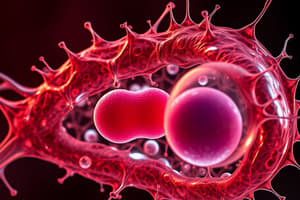Podcast
Questions and Answers
What occurs during the G1 phase of the cell cycle?
What occurs during the G1 phase of the cell cycle?
- Protein synthesis for DNA replication (correct)
- DNA replication
- Mitosis
- Cell division
The S phase of the cell cycle involves the duplication of chromosomes and the synthesis of DNA.
The S phase of the cell cycle involves the duplication of chromosomes and the synthesis of DNA.
True (A)
What is the significance of the G2 phase in the cell cycle?
What is the significance of the G2 phase in the cell cycle?
Cell growth continues and proteins are synthesized in preparation for mitosis.
Cells that are permanently or temporarily suspended from the cell cycle are in the ______ phase.
Cells that are permanently or temporarily suspended from the cell cycle are in the ______ phase.
Match each cell type to its corresponding cell cycle behavior:
Match each cell type to its corresponding cell cycle behavior:
What process involves taking in large molecules by engulfing them with the cell membrane?
What process involves taking in large molecules by engulfing them with the cell membrane?
Exocytosis is a passive process that does not require energy.
Exocytosis is a passive process that does not require energy.
Name the four processes involved in the cell division cycle.
Name the four processes involved in the cell division cycle.
The process of 'cell eating' is known as _________.
The process of 'cell eating' is known as _________.
Match the following phases of the cell cycle with their descriptions:
Match the following phases of the cell cycle with their descriptions:
Which of the following statements about endocytosis is true?
Which of the following statements about endocytosis is true?
The stages of mitosis include prophase, metaphase, anaphase, and telophase.
The stages of mitosis include prophase, metaphase, anaphase, and telophase.
What is formed when the cell membrane engulfs a substance during endocytosis?
What is formed when the cell membrane engulfs a substance during endocytosis?
Flashcards
Vesicle Transport
Vesicle Transport
Moves large molecules or particles across the plasma membrane using vesicles.
Endocytosis
Endocytosis
Process of bringing substances into the cell by engulfing them with the cell membrane.
Pinocytosis
Pinocytosis
Uptake of large molecules like DNA or proteins from the surrounding fluid.
Phagocytosis
Phagocytosis
Signup and view all the flashcards
Exocytosis
Exocytosis
Signup and view all the flashcards
Cell Cycle
Cell Cycle
Signup and view all the flashcards
Interphase
Interphase
Signup and view all the flashcards
Mitosis
Mitosis
Signup and view all the flashcards
What is G2?
What is G2?
Signup and view all the flashcards
What happens during the S phase?
What happens during the S phase?
Signup and view all the flashcards
What is the function of the G2 phase?
What is the function of the G2 phase?
Signup and view all the flashcards
Explain the importance of cell cycle checkpoints.
Explain the importance of cell cycle checkpoints.
Signup and view all the flashcards
What is the G0 phase?
What is the G0 phase?
Signup and view all the flashcards
Study Notes
Vesicle Transport
- Large molecules cannot pass through the plasma membrane or transport proteins.
- Cells use active transport processes (endocytosis and exocytosis) to move these macromolecules.
- Vesicles or other bodies move the macromolecules across the plasma membrane.
- Both processes require energy.
Endocytosis
- Endocytosis is the process of capturing substances or particles from outside the cell.
- The cell membrane engulfs the substance.
- The membrane folds over the substance and becomes completely enclosed forming a vesicle.
- The vesicle pinches off and moves the substance into the cytosol.
- Two main kinds of endocytosis are pinocytosis and phagocytosis.
Pinocytosis
- Also known as "cell drinking."
- This process involves the uptake of large molecules (e.g., DNA, proteins) from solution.
- Vesicles formed are very small and short-lived.
Phagocytosis
- Also known as "cell eating."
- The process of solid particle uptake by a cell.
- Examples include phagocytes engulfing bacteria.
Exocytosis
- Exocytosis describes the process of vesicles fusing with the plasma membrane.
- The vesicles release their contents outside the cell, such as proteins or waste products/toxins.
The Cell Cycle
- The cell cycle is a series of events leading to cell duplication and division.
- Four coordinated processes make up the division cycle: cell growth, DNA replication, distribution of duplicated chromosomes and cell division.
- Mitosis and interphase alternate in the cell cycle
- Mitosis has four stages: prophase, metaphase, anaphase, and telophase.
Interphase
-
Interphase is divided into three phases:
- G1 (Presynthesis): Cell growth and organelle production. DNA not replicated.
- S (DNA synthesis): DNA replication (each chromosome duplicates creating sister chromatids). Centrioles also replicate.
- G2 (Post DNA duplication): Cell growth continues, protein synthesis in preparation for mitosis.
-
G0: Cell cycle activities may stop temporarily or permanently.
-
Cell cycle duration varies significantly among different cells.
- Examples: Skin cells continuously divide, skeletal muscle and nerve cells are arrested in G1, cardiac muscle cells are arrested in G2
Checkpoints and Control mechanisms
- Cell cycle coordination relies on checkpoints and feedback controls.
- These mechanisms ensure that the events of the preceding phase are complete before moving to the next phase.
- Checkpoints ensure any incomplete or damaged chromosomes are not replicated and passed on to daughter cells.
G1 (Gap 1)
- The first gap in the cell cycle, when necessary proteins for DNA replication are produced.
- The cell grows in size and the number of cellular organelles increases.
- DNA is not replicated during G1.
- The cell is metabolically active and continuously grows.
Studying That Suits You
Use AI to generate personalized quizzes and flashcards to suit your learning preferences.



